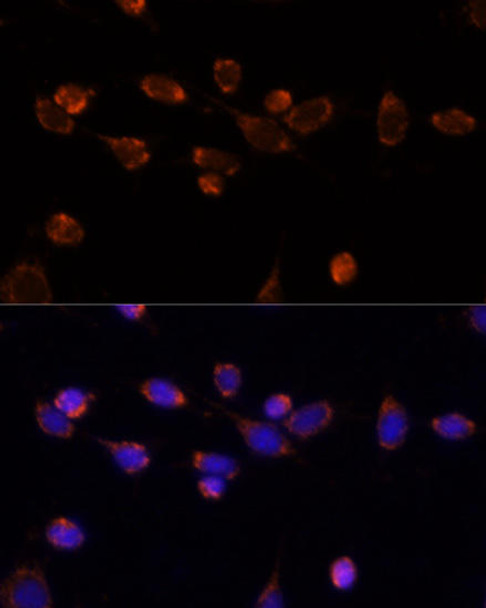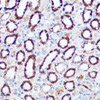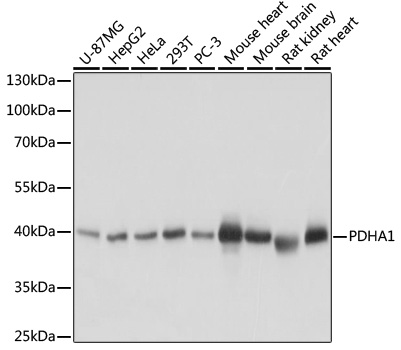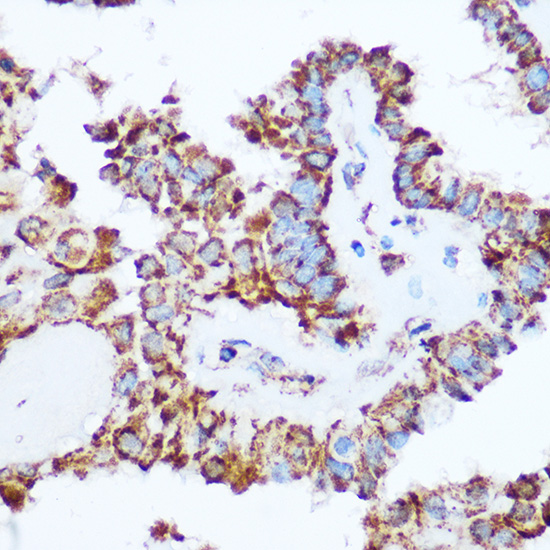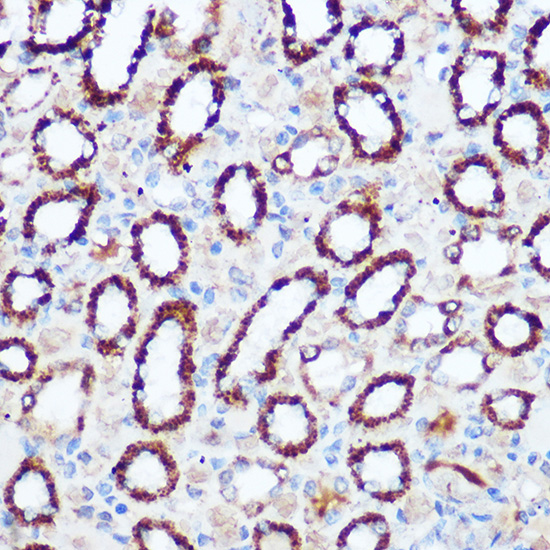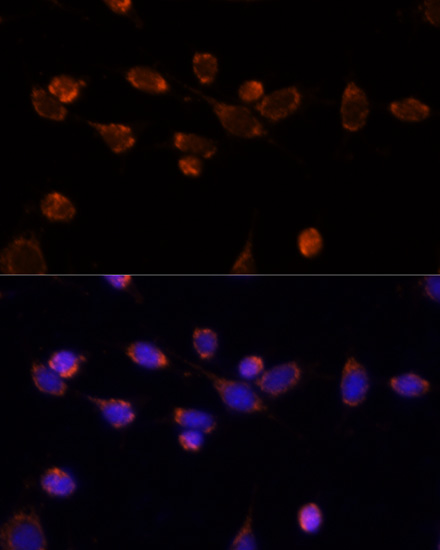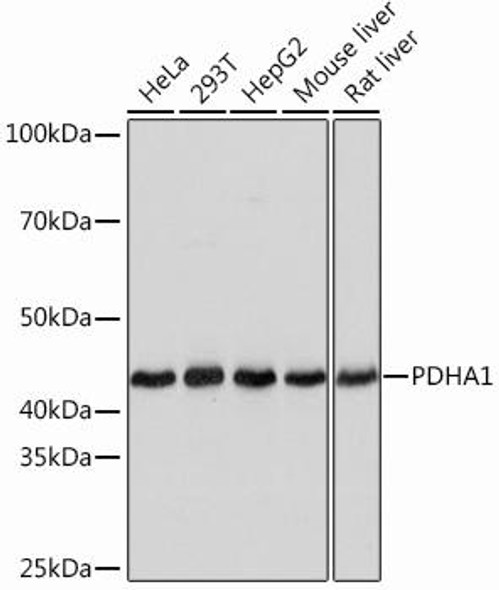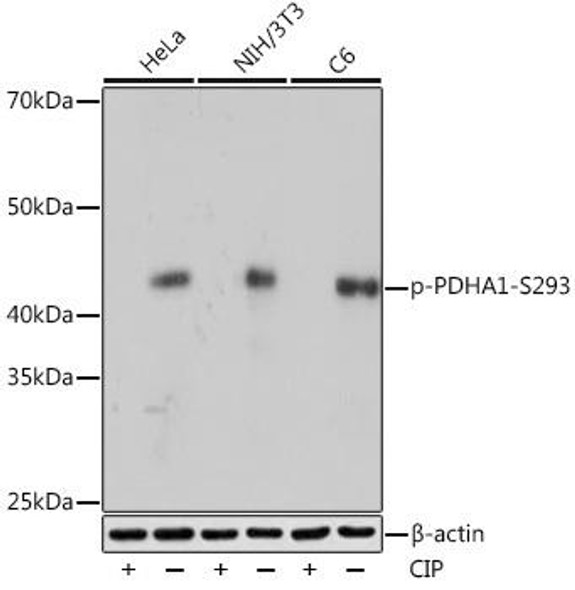Description
Anti-PDHA1 Antibody (CAB17432)
The PDHA1 Polyclonal Antibody (CAB17432) is a valuable tool for researchers studying the PDHA1 protein, an essential component of the pyruvate dehydrogenase complex involved in energy metabolism. This antibody, generated in rabbits, exhibits high specificity and sensitivity for detecting PDHA1 in human samples, making it suitable for use in Western blot and immunohistochemistry applications.PDHA1 is a key enzyme in the conversion of pyruvate to acetyl-CoA, a critical step in cellular energy production. Dysregulation of PDHA1 function has been implicated in various diseases, including metabolic disorders and certain types of cancer.
By utilizing the PDHA1 Polyclonal Antibody, researchers can explore the role of PDHA1 in these conditions and potentially identify new therapeutic targets for intervention.With its ability to selectively bind to PDHA1, this antibody provides researchers with a powerful tool for investigating the function and regulation of this important metabolic enzyme. Its application in diverse research areas, from metabolism to cancer biology, highlights its versatility and potential impact on advancing our understanding of human health and disease.
| Antibody Name: | Anti-PDHA1 Antibody |
| Antibody SKU: | CAB17432 |
| Antibody Size: | 20uL, 50uL, 100uL |
| Application: | WB IHC IF IP |
| Reactivity: | Human, Mouse, Rat |
| Host Species: | Rabbit |
| Immunogen: | Recombinant protein of human PDHA1. |
| Application: | WB IHC IF IP |
| Recommended Dilution: | WB 1:500 - 1:2000 IHC 1:50 - 1:200 IF 1:50 - 1:200 IP 1:20 - 1:50 |
| Reactivity: | Human, Mouse, Rat |
| Positive Samples: | U-87MG, HepG2, HeLa, 293T, PC-3, mouse heart, mouse brain, rat kidney, rat heart |
| Immunogen: | Recombinant protein of human PDHA1. |
| Purification Method: | Affinity purification |
| Storage Buffer: | Store at -20'C. Avoid freeze / thaw cycles. Buffer: PBS with 0.02% sodium azide, 50% glycerol, pH7.3. |
| Isotype: | IgG |
| Sequence: | Email for sequence |
| Gene ID: | 5160 |
| Uniprot: | P08559 |
| Cellular Location: | Mitochondrion matrix |
| Calculated MW: | 40kDa/43kDa/44kDa/47kDa |
| Observed MW: | 43kDa |
| Synonyms: | PDHA1, PDHA, PDHAD, PDHCE1A, PHE1A |
| Background: | The pyruvate dehydrogenase (PDH) complex is a nuclear-encoded mitochondrial multienzyme complex that catalyzes the overall conversion of pyruvate to acetyl-CoA and CO(2), and provides the primary link between glycolysis and the tricarboxylic acid (TCA) cycle. The PDH complex is composed of multiple copies of three enzymatic components: pyruvate dehydrogenase (E1), dihydrolipoamide acetyltransferase (E2) and lipoamide dehydrogenase (E3). The E1 enzyme is a heterotetramer of two alpha and two beta subunits. This gene encodes the E1 alpha 1 subunit containing the E1 active site, and plays a key role in the function of the PDH complex. Mutations in this gene are associated with pyruvate dehydrogenase E1-alpha deficiency and X-linked Leigh syndrome. Alternatively spliced transcript variants encoding different isoforms have been found for this gene. |
| UniProt Protein Function: | PDHA1: a mitochondrial matrix enzyme that catalyzes the oxidative decarboxylation of pyruvate, producing acetyl-CoA and CO2. A key enzyme in controlling the balance between lipid and glucose oxidation depending on substrate availability. The pyruvate dehydrogenase (PDH) holoenzyme is a multi-enzyme complex (PDHC) that contains 20-30 copies of pyruvate decarboxylase tetramers (2 alpha:2 beta)(E1), 60 copies of dihydrolipoamide acetyltransferase (E2), six homodimers of dihydrolipoamide dehydrogenase (E3), plus E3 binding proteins. The activity of PDH is tightly regulated by phosphorylation. The phosphorylation of at least one of three specific serine residues in E1 subunit by PDHK inactivates the PDHC, while dephosphorylation by PDP restores its activity. Sites 1, 2, and 3 of PDHA1 are S293, S300, and S232, respectively. Four PDHK isoenzymes have been described, each with different site specificity: all four phosphorylate sites 1 and 2 but at different rates; for site 1 PDHK2 >PDHK4 >PDHK1 >PDHK3; for site 2, PDHK3> PDHK4 > PDHK2 > PDHK1. Only PDHK1 phosphorylates site 3. PDHA1 deficiency is the most common enzyme defect in patients with primary lactic acidosis. |
| UniProt Protein Details: | Protein type:EC 1.2.4.1; Mitochondrial; Oxidoreductase; Carbohydrate Metabolism - butanoate; Amino Acid Metabolism - valine, leucine and isoleucine biosynthesis; Carbohydrate Metabolism - pyruvate; Carbohydrate Metabolism - citrate (TCA) cycle; Carbohydrate Metabolism - glycolysis and gluconeogenesis Chromosomal Location of Human Ortholog: Xp22.1 Cellular Component: mitochondrial matrix; mitochondrion; nucleus; pyruvate dehydrogenase complex Molecular Function:pyruvate dehydrogenase activity Biological Process: acetyl-CoA biosynthetic process from pyruvate; glyoxylate metabolic process; pyruvate metabolic process; regulation of acetyl-CoA biosynthetic process from pyruvate; tricarboxylic acid cycle Disease: Pyruvate Dehydrogenase E1-alpha Deficiency |
| NCBI Summary: | The pyruvate dehydrogenase (PDH) complex is a nuclear-encoded mitochondrial multienzyme complex that catalyzes the overall conversion of pyruvate to acetyl-CoA and CO(2), and provides the primary link between glycolysis and the tricarboxylic acid (TCA) cycle. The PDH complex is composed of multiple copies of three enzymatic components: pyruvate dehydrogenase (E1), dihydrolipoamide acetyltransferase (E2) and lipoamide dehydrogenase (E3). The E1 enzyme is a heterotetramer of two alpha and two beta subunits. This gene encodes the E1 alpha 1 subunit containing the E1 active site, and plays a key role in the function of the PDH complex. Mutations in this gene are associated with pyruvate dehydrogenase E1-alpha deficiency and X-linked Leigh syndrome. Alternatively spliced transcript variants encoding different isoforms have been found for this gene.[provided by RefSeq, Mar 2010] |
| UniProt Code: | P08559 |
| NCBI GenInfo Identifier: | 129063 |
| NCBI Gene ID: | 5160 |
| NCBI Accession: | P08559.3 |
| UniProt Secondary Accession: | P08559,Q53H41, Q5JPT8, Q9NP12, Q9UBJ8, Q9UBU0, Q9UNG4 Q9UNG5, A5YVE9, B2R5P7, B7Z3T7, B7Z3X5, |
| UniProt Related Accession: | P08559 |
| Molecular Weight: | 47,580 Da |
| NCBI Full Name: | Pyruvate dehydrogenase E1 component subunit alpha, somatic form, mitochondrial |
| NCBI Synonym Full Names: | pyruvate dehydrogenase (lipoamide) alpha 1 |
| NCBI Official Symbol: | PDHA1 |
| NCBI Official Synonym Symbols: | PDHA; PDHAD; PHE1A; PDHCE1A |
| NCBI Protein Information: | pyruvate dehydrogenase E1 component subunit alpha, somatic form, mitochondrial |
| UniProt Protein Name: | Pyruvate dehydrogenase E1 component subunit alpha, somatic form, mitochondrial |
| UniProt Synonym Protein Names: | PDHE1-A type I |
| Protein Family: | Pyruvate dehydrogenase E1 component |
| UniProt Gene Name: | PDHA1 |
| UniProt Entry Name: | ODPA_HUMAN |




